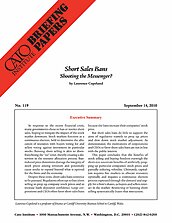Despite these costs, short sales bans continue to be pursued. Regulators often opt to ban short selling to prop up company stock prices and to increase bank depositor confidence. Large corporations and CEOs often favor short sales bans because the bans increase their companies’ stock price.
But short sales bans do little to support the aims of regulators — namely to prop up prices and slow down stock market adjustment. As demonstrated, the motivations of corporations and CEOs to favor short sales bans are not in line with the public interest.
This paper concludes that the benefits of stock selling and buying freedom outweigh the short-run uncertain benefits of artificially propping up particular companies’ stock prices and partially reducing volatility. Ultimately, capitalism requires free markets to allocate resources optimally and requires a continuous election process expressed through the demand and supply for a firm’s shares, as buyers and sellers interact in the market. Restricting or banning short selling systematically biases that interaction.

